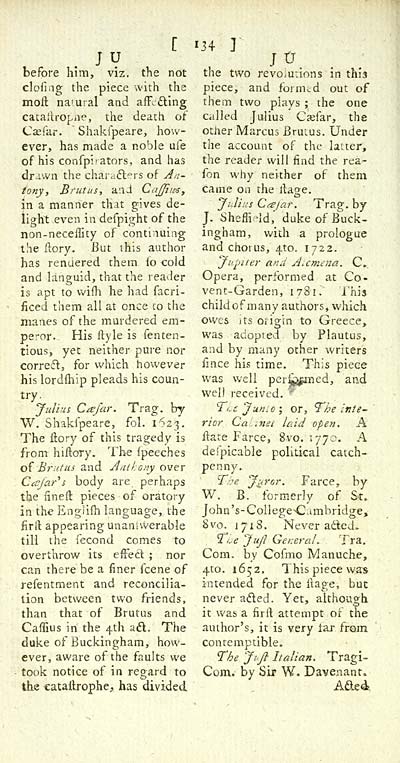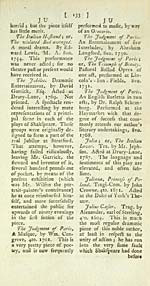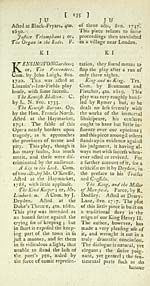Glen Collection of printed music > Printed text > New theatrical dictionary
(148) Page 134
Download files
Complete book:
Individual page:
Thumbnail gallery: Grid view | List view

. ro [
before him, viz. the not
doling the piece with the
moft namral and affccYing
catailropne, the death of
Caefar. Shakfpeare, how-
ever, has made a noble ufe
of his confpi-ators, and has
drawn the characters of An-
tony, Brutus, and CaJJius,
in a manner that gives de-
light even in defpight of the
non-neceffity of continuing
the ftory. But this author
has rendered them io coid
and languid, that the reader
is apt to wifh he had facri-
ficed them all at once to the
manes of the murdered em-
peror. His ftyle is fenten-
tious, yet neither pure nor
correct, for which however
his lordfhip pleads his coun-
try.
Julius Cafar. Trag. by
W. Shakfpeare, fol. 1623.
The iiory of this tragedy is
from hiftory. The ipeeches
of Brutus and Anthony over
Cajar's body are perhaps
the fined pieces of oratory
in the Engiifh language, the
firll appearing unanswerable
till the fecond comes to
overthrow its effect ; nor
can there be a finer fcene of
refentment and reconcilia-
tion between two friends,
than that of Brutus and
Caflius in the 4th aft. The
duke of Buckingham, how-
ever, aware of the faults we
took notice of in regard to
the cataftrophe, has divided
134 ]
the two revolutions in this
piece, and formed out of
them two plays ; the one
called Julius Caefar, the
other Marcus Brutus. Under
the account of the latter,
the reader will find the rea-
fon why neither of them
came on the itage.
Julius Cafar. Trag\ by
J. Sheffield," duke of Buck-
ingham, with a prologue
and chorus, 4to. 1722.
Jupiter and A^cmena. C.
Opera, performed at Co-
vent-Garden, 1781. This
child of many authors, which
owes its origin to Greece,
was adopted by Plautus,
and by many other writers
fmce his time. This piece
was well perijjj$«med, and
well received. * ■
The Junto ; or, The inte-
rior Cabinet laid open. A
ftafce Farce, 8vo. 1770. A
despicable political catch-
penny.
The Juror. Farce, by
W. B. formerly of St.
John's- CollegeCambridge,
8vo. lyiS. Never acted.
Toe Juji General, Tra.
Com. by Cofmo Manuche,
4to. 1652. This piece wars-
intended for the itage, but
never acted. Yet, although
it was a firll attempt of the
author's, it is very rar from
contemptible.
The JiJ} Italian. Tragi-
Com. by Sir W. Davenant.
Acle4
before him, viz. the not
doling the piece with the
moft namral and affccYing
catailropne, the death of
Caefar. Shakfpeare, how-
ever, has made a noble ufe
of his confpi-ators, and has
drawn the characters of An-
tony, Brutus, and CaJJius,
in a manner that gives de-
light even in defpight of the
non-neceffity of continuing
the ftory. But this author
has rendered them io coid
and languid, that the reader
is apt to wifh he had facri-
ficed them all at once to the
manes of the murdered em-
peror. His ftyle is fenten-
tious, yet neither pure nor
correct, for which however
his lordfhip pleads his coun-
try.
Julius Cafar. Trag. by
W. Shakfpeare, fol. 1623.
The iiory of this tragedy is
from hiftory. The ipeeches
of Brutus and Anthony over
Cajar's body are perhaps
the fined pieces of oratory
in the Engiifh language, the
firll appearing unanswerable
till the fecond comes to
overthrow its effect ; nor
can there be a finer fcene of
refentment and reconcilia-
tion between two friends,
than that of Brutus and
Caflius in the 4th aft. The
duke of Buckingham, how-
ever, aware of the faults we
took notice of in regard to
the cataftrophe, has divided
134 ]
the two revolutions in this
piece, and formed out of
them two plays ; the one
called Julius Caefar, the
other Marcus Brutus. Under
the account of the latter,
the reader will find the rea-
fon why neither of them
came on the itage.
Julius Cafar. Trag\ by
J. Sheffield," duke of Buck-
ingham, with a prologue
and chorus, 4to. 1722.
Jupiter and A^cmena. C.
Opera, performed at Co-
vent-Garden, 1781. This
child of many authors, which
owes its origin to Greece,
was adopted by Plautus,
and by many other writers
fmce his time. This piece
was well perijjj$«med, and
well received. * ■
The Junto ; or, The inte-
rior Cabinet laid open. A
ftafce Farce, 8vo. 1770. A
despicable political catch-
penny.
The Juror. Farce, by
W. B. formerly of St.
John's- CollegeCambridge,
8vo. lyiS. Never acted.
Toe Juji General, Tra.
Com. by Cofmo Manuche,
4to. 1652. This piece wars-
intended for the itage, but
never acted. Yet, although
it was a firll attempt of the
author's, it is very rar from
contemptible.
The JiJ} Italian. Tragi-
Com. by Sir W. Davenant.
Acle4
Set display mode to: Large image | Transcription
Images and transcriptions on this page, including medium image downloads, may be used under the Creative Commons Attribution 4.0 International Licence unless otherwise stated. ![]()
| Special collections of printed music > Glen Collection of printed music > Printed text > New theatrical dictionary > (148) Page 134 |
|---|
| Permanent URL | https://digital.nls.uk/90317141 |
|---|
| Description | Scottish songs and music of the 18th and early 19th centuries, including music for the Highland bagpipe. These are selected items from the collection of John Glen (1833 to 1904). Also includes a few manuscripts, some treatises, and other books on the subject. |
|---|
| Description | The Glen Collection and the Inglis Collection represent mainly 18th and 19th century Scottish music, including Scottish songs. The collections of Berlioz and Verdi collected by bibliographer Cecil Hopkinson contain contemporary and later editions of the works of the two composers Berlioz and Verdi. |
|---|

